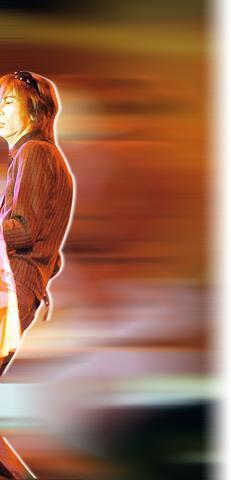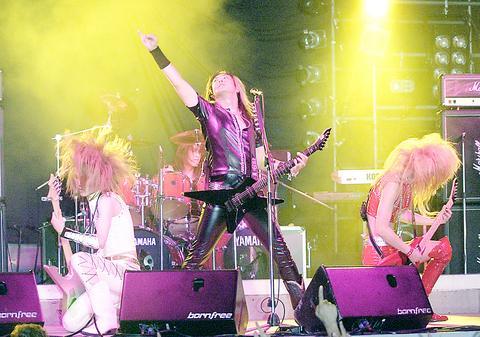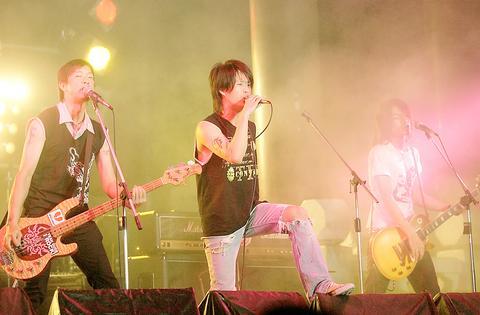Toward the end of Michelle Shocked's set on Friday night at the weekend's Formoz Festival, her guitar was taken off stage for re-stringing and instead of idling on stage until it was ready again, she sang a solo piece without her backup trumpet player and without percussion. It was just her and a mic singing a Vietnam-era anti-war song and the crowd was stunned into a silence rare at the otherwise raucous three-day event.
A lot of bands at the festival had fun grooves and some truly rocked, but for anyone who caught Michelle Shocked's solo number, it was obvious why she was the highest-profile performer of the weekend: the lady's got soul. And throughout her set, not only in that one song, you could feel the depth of experience that the music comes from and the complete lack of pretension in her stage presence.

She joked with the crowd and made a few, but not too many, earnest political statements. But most of all, she sang her heart out. It would was hard, even for those in the audience who didn't quite understand her English, to not get swept away.

The NT$1,000 three-day festival pass would have been a justifiable price for her show alone, but there were over 100 other bands, singers and DJs at the festival and some, like LTK, played some of their best sets ever.
Friday night also featured American Analog Set, who, while not providing the most energetic stage show (the bassist had his back to the crowd throughout their set), played some stunningly beautiful music that should set the standard henceforth for Taipei's post-rock devotees. It might even spawn a small market for vibraphones.

Taipei's youthful punk scene was also on hand to worship at the feet of some of the Japanese hair bands that came, like rAIn and Envy. The enthusiasm for these bands might seem an odd phenomenon for those who thought Smells Like Teen Spirit put the last nail in the coffin of glam rock, but there it was.
Another Japanese headliner, Yoshihiro Hanno, was the star attraction Sunday of the festival's first-ever electronica stage. His blends of hip hop, drum 'n' bass and ambient soundscapes were perfectly arranged, but maybe because of the sweltering heat, or maybe because people got tired of staring at the lids of his two Powerbooks, the crowd dwindled toward the end of his show. (When will organizers of electronica shows finally start having video feeds of the computers' desktops so the audience can watch what's going on?)
The Album Leaf fared better on Friday at the electronica stage, thanks in part to frontman Jimmy Lavelle's mild charisma, but their music, while epic, was grandiose in the manner of an IMAX documentary soundtrack.
But beyond any one band's performance, the festival went forward, at least from the audience's perspective, without a hitch. The flow of people between the five stages located throughout Youth Park, where it was held, was surprisingly smooth and the corporate sponsor presence was more subdued than in years past, when Chunghwa Telecom seemed to be trying to ram its services down people's throats.
The crowds also remained civil, given the heat and uphill sight lines at a couple of the stages that meant short people did a lot of staring at people's backs instead of at performers.
Altogether, some 50,000 people were at the festival over the three days, and according to organizers Taiwan Rock Alliance, no one was arrested for violence or drugs. There was one police action, though, when an officer from a local precinct stormed the PA booth during Sobut's set and turned off the sound, complaining first that the music was disturbing his work and then that the foreign performers didn't have temporary work permits. After passports were produced showing all the appropriate paperwork had been processed for the foreign bands, the cop was sent on his way and the music played on for a great weekend and by all accounts the best festival of the summer.
But don't cry if you didn't make it to the festival. Michelle Shocked, Hong Kong's Primary Shapes, Korea's Mr. Funkey and American Analog Set will play at The Wall tonight. Tickets cost NT$900 for people without three-day festival passes, NT$150 for those with. Doors open at 7pm. The Wall is located at B1, 200 Roosevelt Blvd, Sec 4, Taipei (

On April 26, The Lancet published a letter from two doctors at Taichung-based China Medical University Hospital (CMUH) warning that “Taiwan’s Health Care System is on the Brink of Collapse.” The authors said that “Years of policy inaction and mismanagement of resources have led to the National Health Insurance system operating under unsustainable conditions.” The pushback was immediate. Errors in the paper were quickly identified and publicized, to discredit the authors (the hospital apologized). CNA reported that CMUH said the letter described Taiwan in 2021 as having 62 nurses per 10,000 people, when the correct number was 78 nurses per 10,000

As we live longer, our risk of cognitive impairment is increasing. How can we delay the onset of symptoms? Do we have to give up every indulgence or can small changes make a difference? We asked neurologists for tips on how to keep our brains healthy for life. TAKE CARE OF YOUR HEALTH “All of the sensible things that apply to bodily health apply to brain health,” says Suzanne O’Sullivan, a consultant in neurology at the National Hospital for Neurology and Neurosurgery in London, and the author of The Age of Diagnosis. “When you’re 20, you can get away with absolute

May 5 to May 11 What started out as friction between Taiwanese students at Taichung First High School and a Japanese head cook escalated dramatically over the first two weeks of May 1927. It began on April 30 when the cook’s wife knew that lotus starch used in that night’s dinner had rat feces in it, but failed to inform staff until the meal was already prepared. The students believed that her silence was intentional, and filed a complaint. The school’s Japanese administrators sided with the cook’s family, dismissing the students as troublemakers and clamping down on their freedoms — with

As Donald Trump’s executive order in March led to the shuttering of Voice of America (VOA) — the global broadcaster whose roots date back to the fight against Nazi propaganda — he quickly attracted support from figures not used to aligning themselves with any US administration. Trump had ordered the US Agency for Global Media, the federal agency that funds VOA and other groups promoting independent journalism overseas, to be “eliminated to the maximum extent consistent with applicable law.” The decision suddenly halted programming in 49 languages to more than 425 million people. In Moscow, Margarita Simonyan, the hardline editor-in-chief of the